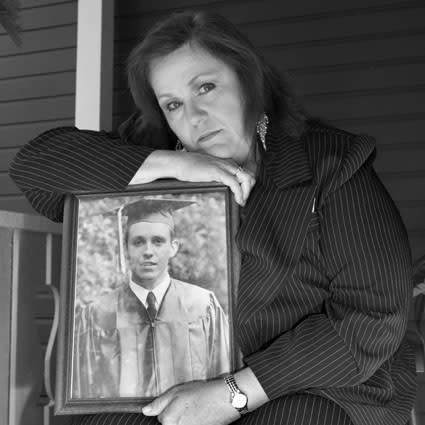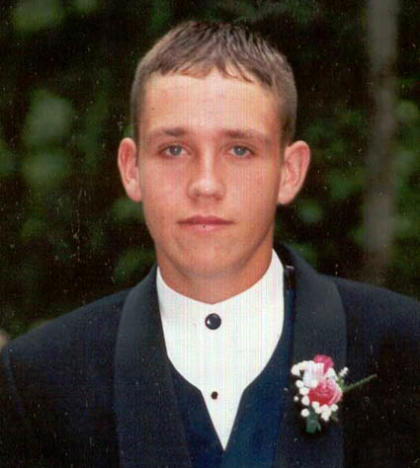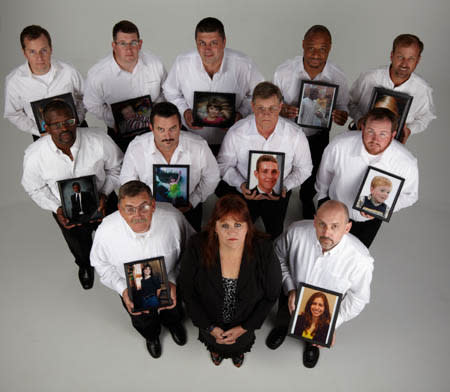A Lost Child, a Mission to Save Others

Frankie Milley's son died a horrible, sudden death from meningitis. And now she's working to protect other families from the same tragedy.
-April Daniels Hussar, BettyConfidential.com"When you come out of the shock of burying your child, you have one of two choices. You can either crawl in the grave and go with them, just die with them, just allow yourself to die -- which is what you really want to do -- or you can make a choice to get busy and try to prevent it from happening to other kids and other families."
-Frankie Milley, Founder, Meningitis Angels
Frankie Milley is a woman with a mission -- to prevent other parents from losing their children to meningitis, the devastating disease that took the life of her only son, Ryan, when he was only 18 years old. As the founder of Meningitis Angels, Frankie has worked tirelessly to both educate the public about meningococcal disease and to help the children and families whose lives are profoundly, horribly affected by it. When she speaks, Frankie focuses on the personal cost of meningitis -- not only the deaths, but the survivors, who often live with severe disabilities and disfigurement. She talks about the need for education, awareness and most of all, prevention. It's her mission in life, and she tells a powerful story, a story that begins in the worst tragedy a mother can imagine, the loss of her child, and somehow ends in hope.
I spoke with Frankie the day after she attended a stakeholders meeting in Washington DC on May 25th. The meeting, organized by the Centers for Disease Control (CDC), brought together various health organizations, advocacy groups, concerned citizens and CDC members to discuss infant meningococcal disease and vaccines. Over the summer there will be four regional meetings, which will be held in Seattle, Chicago, Denver, and Concord, NH.
Frankie, tell me about these meetings. Are they specifically to decide if an infant meningitis vaccine should be approved and added to the infant vaccination schedule?
Right now they're gathering information and public opinion ... to see if this is something the public would want and that the medical field thinks is the thing to do. At the end of the day, yes, they'll be using a lot of this data to make their decisions.
What do you feel the general public opinion is about meningitis and vaccines?
I think the general public doesn't know a whole lot about infant meningococcal disease. Other than our site (Meningitis Angels), you really don't see a whole lot about it. Because we haven't had vaccines for it in the past, I think ... and if you don't have something to prevent something, you don't necessarily want to talk a whole lot about it. That's not a good thing because there are preventions. Right now, there are available approved vaccines for children, and new vaccines for infants that are expected to be approved soon. In addition to vaccines there are other things you can do. It's really important that parents are educated about it.
We've created a new website - www.protectinfantsnow.org - where parents can see videos from some of our Angel parents and survivors, learn the facts about the disease and understand why it's important that disease is prevented.
What went on at the meeting? How did it go?
The CDC did a really great job about laying out the disease information, and then I was allowed to present along with other organizations, to present and show the face of the disease. We presented a video and I spoke about various infants and children in our group who would have not contracted the disease if their parents had known about the available meningococcal vaccines and had their children vaccinated. It was a real informative meeting, just to discuss the disease and the vaccines that are being looked at by the FDA for approval now. It was just a really great day.
Why is this such an important issue to you?
I lost my only child Ryan to meningococcal disease at the age of 18. He went from having a fever to blood streaming from every orifice of his body in less than 14 hours. And after that, I found out there was a vaccine that could have prevented it, and I didn't know about it. And I thought, that's not right. So I began my campaign almost 12 years ago ... to make sure that other parents were made aware of this disease.
Parents need to be educated on the disease -- and on the outcome of what the disease can be if you don't vaccinate. When it comes and strikes a child, it's devastating. About half of infants die, and the ones that don't die are severely debilitated.


Frankie's son Ryan on his prom day
After you lost Ryan, how did you find the strength to do what you're doing?
When you come out of the shock of burying your child, you have one of two choices. You can either crawl in the grave and go with them, just die with them, just allow yourself to die -- which is what you really want to do -- or you can make a choice to get busy and try to prevent it from happening to other kids and other families. And that's the choice I took. I'm usually a person who will take the high road. I have a real strong faith. I know that I will see Ryan again, by my faith, so it's just matter of, what am I going to do in the meantime? So ... I'm going to make a difference. I think if you can take a tragedy and turn it into something positive, then you've already won.
Tell me about some of your accomplishments with Meningitis Angels. What are you most proud of?
First of all, it's a charitable organization. Through Meningitis Angels, we've helped many children within our network with health aid and various support that they might need. We've provided gates and hearing systems and special computers for the blind. We try to meet all different kinds of needs, whether it be emotional support for the families or kids, or some kind of hands-on services that we can do.

Meningitis Angels Dads, holding photos of their sons and daughters who were stricken with the horrible disease - some survived, some lost the battle.
What's your main message and mission in terms of legislation?
We've always made it our policy to focus on infants through young adults. Meningitis does not stop at the dorm room door, and I think that's a real sad misunderstanding out there. People mostly think that meningococcal / meningitis is a dorm room disease, that only college kids in dorms are the ones who get it. But infants account for over 30 percent of the cases in the US, which is just as high or higher than the college rate, and then adolescents come in there really close. And so through the years, Meningitis Angels with me leading this advocacy has managed to pass several laws in Texas and around the country. We've testified on policy and helped make mandates. In Texas, we have some of the strongest laws now.
What's the number one thing you want to tell parents?
The most important message is that infants, children, toddlers and teens are ALL at risk, and they all need to be protected. Your child is at risk for this disease. And in some cases it's preventable, and you need to be fully educated on it so you can make an informed decision about whether to vaccinate or not.
How do you recommend people get involved?
As we grow and move forward with the regional meetings and the CDC effort to collect public opinion, I think it's really important that parents really educate themselves. www.protectinfantsnow.org will provide parents will all the information they need - including how parents and anyone interested can contact us if they can attend some of the regional meetings.
Finally, what do you say to parents who are fearful of the potential dangers of vaccinations?
It's a proven fact that vaccines are safe and effective. I honestly think that if parents go to to www.protectinfantsnow.org they will understand this disease, they will see the facts, and they will see real children that have been affected. I think it will help them to make a really good choice. The disease speaks for itself.
If infants and children had a voice they would choose a vaccine over a debilitating disease. They don't have a voice, but we can be that voice.
More from BettyConfidential.com:
